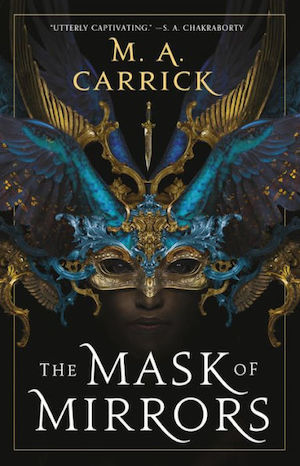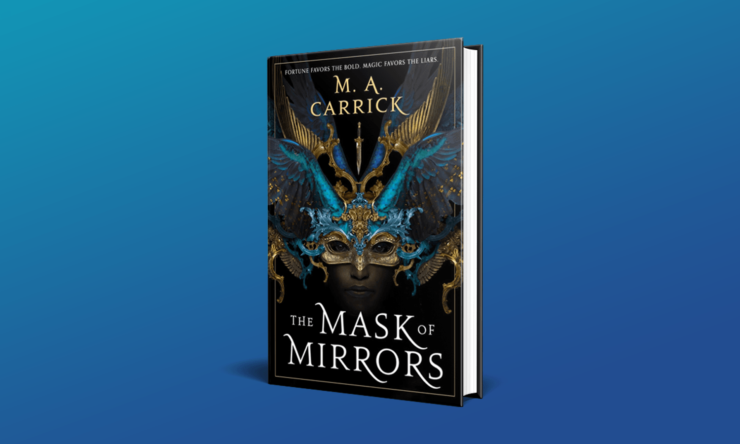M.A. Carrick is an open pseudonym for writing team Marie Brennan and Alyc Helms. Brennan’s track record needs scant introduction, with twelve books to her name—including, mostly recently, the acclaimed Memoirs of Lady Trent series and its spin-off sequel Turning Darkness into Light. Helms is perhaps less well known, though they have previously published two solo novels, 2015’s The Dragons of Heaven and 2016’s The Conclave of Shadows.
The Mask of Mirrors is the first novel to come jointly from their pens, and it reminds me strikingly of the Astreiant novels of Melissa Scott and the late Lisa A. Barnett’s Astreiant novels, albeit more in worldbuilding and tone than in characters and concerns.
Nadežra is a divided city. Once the sacred capital of the Vraszenian people, it’s now ruled by the descendents of Liganti conquerors in the form of the great houses and the delta gentry: a mercantile nobility that operates by contract and charter, and that charges the Vraszenians for access to the site of their sacred mystery. Ethnic and cultural Vraszenians form an underclass in the city, one with very restricted social mobility.
Ren is a con artist. She grew up in Nadežra, a street thief raised by a brutally manipulative con artist, and escaped with her sworn-sister Tess after believing her gang boss had killed their sworn-brother. Calling herself Renata Viraudax, she and Tess have returned to the city after years of absence, because Ren has a scheme to get herself enrolled as Nadežran nobility, with access to all the wealth and safety that class presumably has to offer: pass herself off as the daughter of House Traemontis’s long-lost and deeply unlikeable sister, seeking a reconciliation. Ren is an expert at getting people to like and believe her, and she has details of that long-lost sister at her fingertips, so she believes she has a good shot.
Buy the Book


The Mask of Mirrors
But what Ren doesn’t know is that House Traemontis’s fortunes are on the wane. There are only three members of the family left alive: matriarch Donaia, who’s holding things together by sheer force of will and effort, golden boy Leato, with a good heart and a remarkable friendship with a Vraszenian who’s reached the rank of captain in the Vigil (the city police), and Giuna, Leato’s socially-isolated younger sister. Traemontis has no allies, and powerful enemies, including Mettore Indestor—wealthy, militarily powerful, in charge of the Vigil, and holding one of the seats on the five-person council that governs the city. Ren’s attempts to con her way to safety, with Tess as her loyal maid, catapult her into the middle of intrigue, especially when she comes to feel real affection and sympathy for the Traemontis family.
As Ren is framing herself as another player on the city’s social stage, she finds herself of in the orbits of both wealthy crime-boss-turning-legitimate-businessman Derossi Vargo, who has a hidden agenda of his own—and speaks with a being that might only exist in his head, unless it’s actually a spirit in the form of his pet spider—and of Grey Serrado, the only Vraszenian captain in the Vigil, and a man who’s desperate to discover why children are dying, unable to sleep, in the poorest sections of the city. Intrigue, manoeuvring, lies, drugs, riots, and magical disasters combine in an explosive mix that may change the balance of power in Nadežra for good—and destroy Ren and Tess without a second thought.
The Mask of Mirrors gives us a rich world—a compellingly-drawn city—with a depth of history and layers of competing agendas. It has multiple different kinds of magic, from the more upper-class science of numinat and the more artisanal imbuing, to the influence of astrology and of patterning—card-reading that can reveal a person’s future, or fate. And it gives us layered, compelling characters, who’re sympathetic and understandable, and a plot that mounts with carefully-measured tension and nested capers and revelations to an explosive climax.
Spoilers ahead.
It also has a number of unanswered questions, a handful of unexplained coincidences, and some secrets and mysteries that aren’t resolved—or are not resolved satisfactorily within its pages. What’s Vargo’s real agenda? Why is he talking in his head to an invisible spirit, and how? What’s behind the Rook? Did Mettore Indestor really have a complicated, expensive, magic-based plot to carry out a form of genocide? How is it that Ren’s old gang boss is at the heart of things? How does the curse on House Traemontis also come to involve Ren herself? Though the main plot of The Mask of Mirrors reaches a resolution—this is a self-contained volume, ending with a point of equilibrium and stability, rather than with a cliffhanger—these questions linger. There’s more than enough meat for a sequel in these alone. And I hope to see one.
The Mask of Mirrors is engaging and entertaining. It’s the first novel in what feels like months (and might be mere weeks, or even days: what is time, in this age of our pandemic?) that I’ve read with an increasingly sense of delight and looked forward to being able to talk about. It’s great. I loved it. You should give it a try.
The Mask of Mirrors is available from Orbit.
Liz Bourke is a cranky queer person who reads books. She holds a Ph.D in Classics from Trinity College, Dublin. Her first book, Sleeping With Monsters, a collection of reviews and criticism, was published in 2017 by Aqueduct Press. It was a finalist for the 2018 Locus Awards and was nominated for a 2018 Hugo Award in Best Related Work. She was a finalist for the inaugural 2020 Ignyte Critic Award, and has also been a finalist for the BSFA nonfiction award. Find her on Twitter. She supports the work of the Irish Refugee Council, the Transgender Equality Network Ireland, and the Abortion Rights Campaign.










